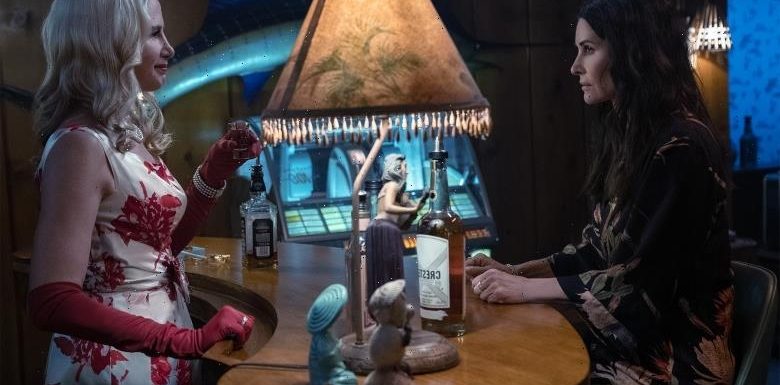
We’ve welcomed the undead into our living rooms since the days of “Dark Shadows.” But in the decades since, most of those stories have been about life and death battles between the living and the dead, with a dose of forbidden romance tossed in.
“Buffy the Vampire Slayer” and “The Walking Dead” focused on averting the apocalypse. Other shows, like “Ghost Whisperer,” zeroed in on the spooky. But in today’s TV landscape, death is something we’re far more comfortable with, and the no longer living aren’t treated as monsters or even as metaphors. Instead, they’re used as tools to investigate a wide array of topics as varied as feminism, political disenfranchisement, and trauma. And in the case of “The Good Place,” all of the above and more.
The last six months alone have seen the premieres of CBS’ “Ghosts,” Starz’s “Shining Vale,” and Season 2 of Prime Video’s “Upload,” all of which revolve around the undead and all of which take radically different approaches to how we interact with death.
At a time where we’re simultaneously struggling with a frightening future and examining the inequities of the past, shows about the living co-existing with the dead create space for more nuanced conversations. The purpose of the undead on TV may no longer be to interrogate good and evil. But we’re still tuning in to hear what those on the other side have to say about the ways in which we live now.
“Upload”
Liane Hentscher/Amazon Prime Video
Maybe our new comfort level began with the rediscovery of Bryan Fuller’s “Pushing Daisies,” when it began streaming on HBO Max during the pandemic. In a world where we couldn’t have physical contact with our loved ones for fear of contracting a deadly virus, the love story between Ned and his reanimated childhood love Chuck — who would permanently die if they touched — hit differently than when the show first ran for an all-too-short two season in the late aughts.
Likewise, Greg Daniels’ “Upload” (about a near future in which Heaven is a man-made construct and your consciousness can be uploaded to a carefully curated after life — depending on how much you’re willing to spend) premiered in the early days of the COVID-19 pandemic, where the story of the recently deceased Nathan (Robbie Amell) and his afterlife concierge Nora (Andy Allo) was suddenly all too familiar. They are drawn to each other, but their will-they-or-won’t-they romance is a far cry from Sam and Diane sparring on “Cheers.” Their love story can never truly progress because death — or life, depending on your viewpoint — are in the way.
“One of the things I was attracted to for this story was one of them is dead,” Daniels told IndieWire. “That’s a pretty big obstacle. And it resonates with the problem that all lovers have, which is one day, one of them is going to die. And when one of them is dead from the beginning, the poignancy is kinda baked in.”
“Ghosts”
CBS
Poignancy has always been at the heart of these series — think of Barnabas and Victoria’s doomed love — and what has been particularly potent to watch lately is how series build their worlds from a foundation of loss. “Ghosts” finds gentle comedy and camaraderie in its premise of the dead finally being seen by a living person, who just moved into her recently inherited mansion. As Sam (Rose McIver) interacts with everyone from a Viking to a Wall Street bro, the ghosts reveal the blinkered thinking of their various eras, from former chatelaine Hetty (the peerless Rebecca Wisocky) making snide remarks about the Irish to Revolutionary War officer Isaac (Brandon Scott Jones) stoutly refusing to acknowledge his attraction to men.
In the months before the premiere of “Abbott Elementary” upended notions about network sitcoms, “Ghosts” scored great ratings and a Season 2 renewal. Based on the British series of the same name, the show clearly hit a nerve with audiences. Watching, it’s not hard to see why. What could be more of a relief than a weekly reminder that prejudices can be eradicated, that political differences can be ameliorated, and that the dead can find closure even after the abrupt end of a too-brief life? And to find that hell really does exist and the truly unredeemable are sentenced to it?
Hell exists on “Shining Vale” too, though it’s the hell of the American family and of womanhood itself that’s under examination. Their marriage hanging on by a thread, couple Pat (Courteney Cox) and Terry (Greg Kinnear) uproot their lives to start over with their two teenage children in a massive home in Connecticut that comes with a grand staircase, a tiki bar, and the spirit of a dead ‘50s housewife, Rosemary (Mira Sorvino, having a ball). Struggling with writer’s block, Pat quickly realizes that the antidepressants her couples therapist swiftly prescribed, combined with Rosemary possessing her, is a quick fix. Pat wants to write her way out of her current misery; Rosemary wants to write the happy ending that a housewife who died before the publication of “The Feminine Mystique” missed out on. What could go wrong?
A potent cocktail of sitcom and horror, the series’ funniest running joke is that Pat is more popular with her family when most influenced by Rosemary, a woman who spent her life without any true agency. In the world of “Shining Vale,” women may no longer host soirees with a cigarette holder clamped in one hand, but the infuriated frustrations remain intact.
Everything old is new again, in other words — but at least within these stories, our pasts and our ever-looming digitized futures can be transformed into something a little less frightening. Even with the presence of the dead.
Source: Read Full Article


